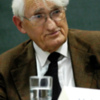Hans Kelsen (1881–1973)
Author of Pure Theory of Law
About the Author
Image credit: Photo by Fritz Kern, 11 October 1971 / Copyright ÖNB/Wien
Works by Hans Kelsen
What is Justice?: Justice, Law, and Politics in the Mirror of Science: Collected Essays (1957) 91 copies
Introduction to the Problems of Legal Theory: A Translation of the First Edition of the Reine Rechtslehre or Pure… (1967) 49 copies
A New Science of Politics: Hans Kelsen's Reply to Erik Voegelin's "New Science of Politics" (Prictical Philosophy) (2004) 4 copies
Democrazia e cultura 3 copies
Problemas capitales de la teoría jurídica del Estado : (desarrollados con base en la doctrina de la proposición… (2010) 2 copies
Religión secular : una polémica contra la malinterpretación de la filosofía social, la… (2015) 2 copies
Teoria general del estado 2 copies
CONTRIBUCIONES A LA TEORIA PURA DEL DERECHO. BIB. DE ETICA, FILOSOFIA DEL DERECHO Y POLITICA (1999) 2 copies
Esencia y valor de la democracia / Hans Kelsen. "La teoría pura del derecho de Hans Kelsen" / Peter Römer (1901) 1 copy
Teoría general del Estado 1 copy
¿Se convertirá la sentencia del Juicio de Núremberg en un precedente para el derecho internacional? 1 copy
Scienza e Natura 1 copy
La polémica Kelsen - Cossio. Teoria pura del derecho versus Teoria Egológica del derecho. (2020) 1 copy
Controverses sur la théorie pure du droit : Remarques critiques sur Georges Scelle et Michel Virally (2005) 1 copy
Sociologia della democrazia 1 copy
The Sociology of Behaviour and Psychology: Society and Nature: A Sociological Inquiry (International Library of… (2003) 1 copy
Foundations of Democracy 1 copy
Tagged
Common Knowledge
- Birthdate
- 1881-10-11
- Date of death
- 1973-04-19
- Gender
- male
- Nationality
- Austria
USA
Czech Republic (birth) - Country (for map)
- Austria
USA
Czech Republic - Birthplace
- Prague, Czech Republic
- Place of death
- Berkeley, California, USA
- Places of residence
- Vienna, Austria
- Education
- University of Vienna
University of Heidelberg - Occupations
- jurist
Philospher - Relationships
- Schutz, Alfred (student)
- Awards and honors
- American Society of International Law (Honorary Member, 1938)
Karl Renner Prize (1953)
Feltrinelli Prize (1960)
Order of Merit of the Federal Republic of Germany (Grand Merit Cross with Star, 1961)
Austrian Decoration for Science and Art (1961)
Decoration of Honour for Services to the Republic of Austria (Great Silver Medal with Star, 1967)
Members
Reviews
Awards
You May Also Like
Statistics
- Works
- 75
- Members
- 690
- Popularity
- #36,666
- Rating
- 3.8
- Reviews
- 7
- ISBNs
- 219
- Languages
- 12
- Favorited
- 1
















Actually, the motivation was that in a Yale course available online that I followed in the early 2010s, Kelsen was quoted, along with Schmitt and others (I shared in the past my reviews on other books on the same theme).
Why now?
Because currently I am living in Italy, and as the Fall of the Berlin Wall in 1989 resulted eventually in a re-arrangement of the country that still has to be settled (the so-called "Seconda Repubblica"), this unsettled status after the re-assuring cocoon of the Cold War is being again questioned.
Reasons? While many in Italy live the Brexit debate as something not directly affecting Italy or, at the other extreme, as a business opportunity (as Italy weren't part of the EU), in reality Brexit is yet another instance of those opportunities to apply the "Monnet" and jump forward or, at least, radically restructure, within the EU integration.
The Italian issue is that, by adopting an inward-looking approach, we risk being "neither"- neither outside, nor inside, simply "in between", and considered at best an opportunistic ally and market to use.
Rethinking the structure and cohesive elements of the State implies also rethinking the concept of law in a country where it seems that creating a new law or regulation, and associated bureaucratic infrastructure, is always the solution.
Only to discover, somewhat later, that that resulted in yet another "self-regulated bureaucratic tribe" that does as it pleases, notably cutting corners whenever feels that it is either right or useful to do so.
Tinkering with a Constitution is never wise, but tinkering by simply "taking loans" from those of others is irresponsible- unless somebody is so detached from reality to assume that a country can be a bit German on this, a bit French on that, a bit British on that, while having or refusing to "harmonize" any behavior that contradicts those cultural frameworks.
Being Italian, I use Italy as a discussion point- but due to its influence, and, as I said, the current rethinking of Europe as well as international institutions, instead of looking at writing laws and treaties, considering the underlying philosophy and "teleology" matters.
Moreover, when, as some already started doing, there are proposal to offload tribunals by "automating" some lower impacts (i.e. higher volume, lower per-unit-value) cases.
Which, incidentally, as the cases that define the "spirit" of social cohesion and civility.… (more)